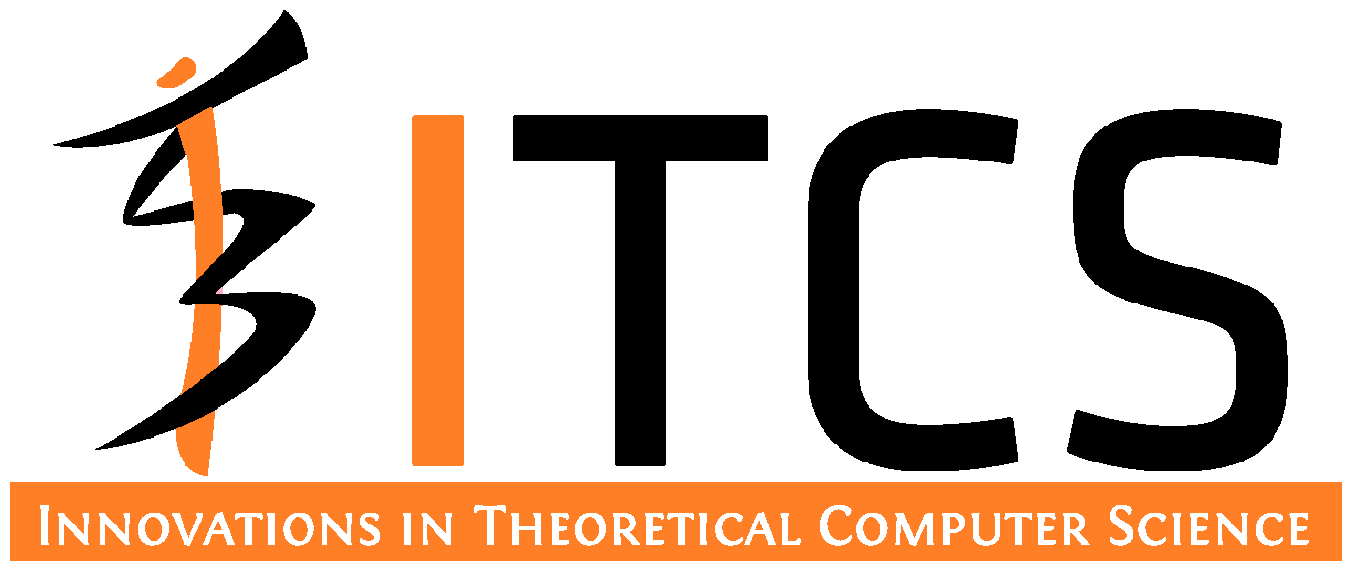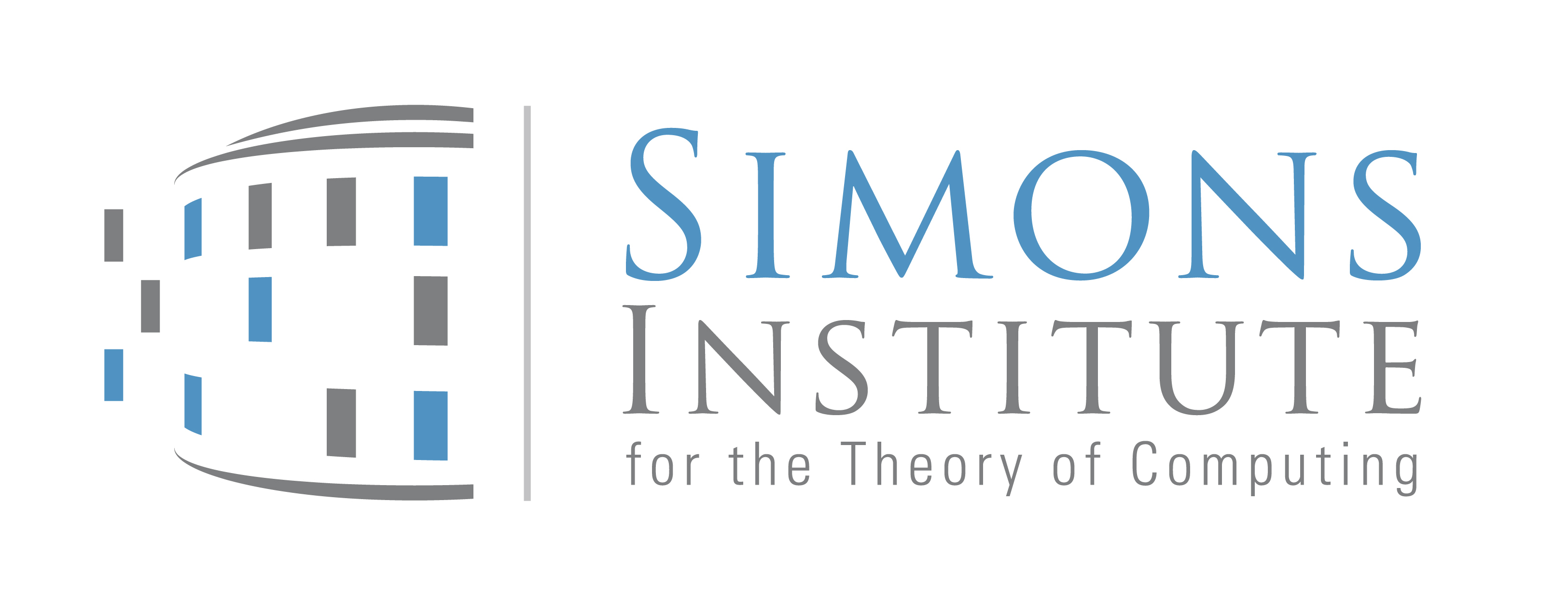

ITCS seeks to promote research with innovative or bold agendas, which could be conceptual, technical, or methodological, and whose message will advance and inspire the greater theory community. The program committee welcomes papers introducing a new concept, model or understanding; opening a new line of inquiry within traditional or interdisciplinary areas; introducing new mathematical techniques and methodologies, or new applications of known techniques; putting forth a bold, even if preliminary, vision or line of attack; or unearthing novel or surprising connections between different topics.
|
Abstract submission deadline: Submission deadline: Notification to authors: Conference dates: |
September 3, 2024 (04:59pm PDT) September 5, 2024 (04:59pm PDT) November 2, 2024 January 7-January 10, 2025 |
|
Ittai Abraham, Intel Sepehr Assadi, University of Waterloo Andris Ambainis, University of Latvia Prabhanjan Ananth, University of California, Santa Barbara Srinivasan Arunachalam, IBM Research Hadley Black, University of California, San Diego Adam Bouland, Stanford University Eshan Chattopadhyay, Cornell University Lijie Chen, University of California, Berkeley Rishabh Goyal, University of Wisconsin-Madison Prahladh Harsha, Tata Institute of Fundamental Research Aayush Jain, Carnegie Mellon University Rahul Jain, National University of Singapore Michael Kapralov, École polytechnique fédérale de Lausanne Robert Kleinberg, Cornell University Vasilis Kontonis, University of Texas at Austin Pravesh Kothari, Princeton University Ravi Kumar, Google Research Jason Li, Carnegie Mellon University |
Daniel Lokshtanov, University of California, Santa Barbara Pasin Manurangasi, Google Research Raghu Meka, UCLA (Chair) Dor Minzer, Massachussetts Institute of Technology Chinmay Nikhre, University of Washington, Seattle Shayan Oveis Gharan, University of Washington, Seattle Prasad Raghavendra, University of California, Berkeley Guy Rothblum, Apple Shubhangi Saraf, University of Toronto Sushant Sachdeva, University of Toronto Tselil Schramm, Stanford University Sahil Singla, Georgia Institute of Technology Srikanth Srinivasan, University of Copenhagen Avishay Tal, University of California, Berkeley Roei Tell, University of Toronto Christos Tzamos, University of Athens David Wajc, Technion Ryan Williams, Massachussetts Institute of Technology Jiapeng Zhang, University of Southern California |
Authors should register and submit their paper via hotcrp submission site, by the above strict deadlines. The font size should be at least 11 point and the paper should be single column. Beyond these, there are no formatting requirements. Authors are required to submit a COI declaration upon submission.
The conference will employ a lightweight double-blind reviewing process. Submissions should not reveal the identity of the authors in any way. In particular, authors’ names, affiliations, and email addresses should not appear at the beginning or in the body of the submission. (Author and institution information will be uploaded separately on the submission site.) The purpose of this double-blind process is to help PC members and external reviewers come to a judgment about the paper without unconscious bias, and is not intended to make it impossible for them to discover who the authors are. Nothing should be done in the name of anonymity that weakens the submission or makes the job of reviewing the paper more difficult. In particular, important references should not be omitted or anonymized. In addition, authors should feel free to disseminate their ideas or draft versions of their paper as they normally would. For example, authors may (and are in fact encouraged to) post their papers to arXiv/ECCC/IACR etc.
Authors should strive to make their paper accessible not only to experts in their subarea, but also to the theory community at large. The submission should include clear proofs of all central claims. In addition, it is strongly recommended that the paper contain, within the first 10 pages, a concise and clear presentation of the merits of the paper, including a discussion of its significance, innovations, and place within (or outside) of our field's scope and literature. The committee will put a premium on writing that conveys clearly, in as simple and straightforward a manner as possible, what the paper accomplishes.
Submissions authored by program committee members (with the exception of the PC chair) are allowed. Utmost care will be taken to avoid COIs with PC submissions, ensuring that such submissions receive no unfair advantage, and that the reviews and the discussion remain confidential from the authors.
All submissions will be treated as confidential, and will only be disclosed to the committee and their chosen sub-referees. In addition, the program committee may consult with journal editors and program chairs of other conferences about controversial issues such as parallel submissions.
Results published/presented/submitted at another archival conference will not be considered for ITCS. Simultaneous submission to ITCS and to a journal is allowed. Papers accepted to ITCS should not be submitted to any other archival conferences.
Authors are encouraged to post full versions of their submissions in a freely accessible online repository such as the arxiv, the ECCC, or the Cryptology ePrint archive. It is generally expected that authors of accepted papers will make full versions of their papers, with proofs, available before the conference begins.
All the talks are expected to be in person. The talks in the conference will not be recorded, and instead the authors of each paper will be asked to upload a 20-25 minute talk, which will be posted online.
Participants near to graduation (on either side) will be given an opportunity to present (in 2-3 minutes) their results, research, plans, personality, and so on during the "Graduating bits" session. This is one of the important traditions of ITCS, and not to be missed! Details on how to participate will be provided closer to the conference date.
The committee may award a "best student paper" award.
ITCS is committed to an inclusive conference experience, respectful of all participants, and free from any discrimination or harassment, including unwelcome advances or propositions of an intimate nature, particularly when coming from a more senior researcher to a less senior one. All ITCS attendees are expected to behave accordingly. If you experience or witness discrimination, harassment or other unethical behavior at the conference, we encourage you to seek advice by contacting SafeToC advocates (http://safetoc.org/index.php/toc-advisors/)
The accepted papers will be published by LIPIcs in the electronic proceedings of the conference. To accommodate the publishing traditions of different fields, authors of accepted papers can ask the PC chair to have only a one page abstract of the paper appear in the proceedings, along with a URL pointing to the PDF of the full paper on an online archive.
